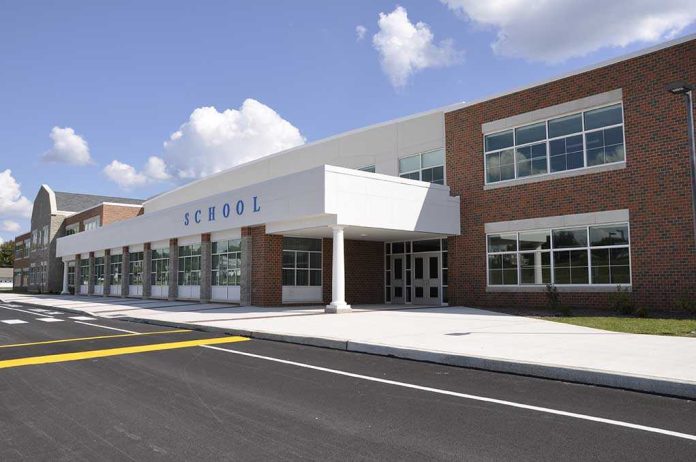
What happens when a high school locker room becomes the battleground for America’s fiercest debates over gender, privacy, and parental rights? Loudoun County, Virginia, just provided the answer—and the ripples may reach every public school in the nation.
Story Snapshot
- Parents of two boys suspended for alleged harassment of a transgender student raised $125,000 to sue their school district.
- A federal judge’s rare bond requirement and Title IX findings fueled national attention and debate.
- The legal fight centers on whether discomfort equals discrimination, and who decides the boundaries of privacy in public schools.
- The outcome may reshape school policies on gender identity and parental authority across America.
Parental Rights and Title IX Collide in Loudoun County
In March 2025, Stone Bridge High School in Loudoun County became the epicenter of a national controversy when two male students expressed discomfort about sharing a locker room with a transgender classmate. A cell phone video—later made public—captured the exchange, igniting a Title IX investigation that would suspend the boys for sexual harassment and sex-based discrimination. Their parents, Seth Wolfe and Renae Smith, refused to accept the school’s ruling. They argued their sons weren’t harassers, just teenagers voicing honest concerns about privacy. Their response wasn’t just a protest—it was a lawsuit, fueled by a $125,000 war chest raised in record time.
The school district, Loudoun County Public Schools (LCPS), insisted it followed federal law. Title IX, once a shield against gender discrimination, now stood at the center of a cultural standoff. LCPS maintained its commitment to a safe, inclusive environment, vowing to uphold anti-harassment policies for all students—including those whose gender identity didn’t match their biological sex. But critics saw overreach: Was honest discomfort now a punishable offense? Or did the school’s response reflect a new era of compelled speech and forced compliance?
A Legal Fight Fueled by Unusual Measures and National Attention
By October, the dispute had moved from locker room to courtroom. Federal Judge Leonie Brinkema didn’t just allow the families to sue—she demanded they post a $125,000 bond, a rare move in civil rights litigation. The requirement drew outrage and headlines, as supporters crushed the fundraising goal in days. The bond was eventually extended, and the litigation pressed forward, with advocacy groups like America First Legal and the Founding Freedoms Law Center joining the parents’ side. Meanwhile, the Department of Education’s own investigation complicated matters further, finding that LCPS had violated Title IX and retaliated against the boys. One student’s suspension was paused; the other left the district.
The stakes rose with every legal filing. The parents argued they were fighting for their sons’ futures, their reputations, and the principle that expressing discomfort isn’t a crime. The school and its defenders countered that Title IX’s protections depend on enforcement, and that rolling back those standards would endanger some of the most vulnerable students. At every turn, both sides portrayed themselves as standing for fundamental rights—either privacy and parental authority, or inclusion and safety.
The Broader Impact: Schools, Policies, and a Nation Watching
Legal experts have called the court-ordered bond “highly unusual,” warning it could discourage other parents from challenging school policies, no matter how strongly they feel. Civil rights attorneys see the case as a test of the limits of Title IX, and whether discomfort qualifies as harassment or protected speech. Policy analysts warn that regardless of the outcome, schools across the country may soon revisit their locker room and bathroom policies—some tightening privacy rules, others doubling down on inclusive access. The Department of Education’s involvement signals a future of increased federal scrutiny, and possibly more litigation, as school districts struggle to interpret—and enforce—rapidly evolving laws on gender identity.
The local impact is already profound. The two families have endured public scrutiny and legal bills. The transgender student and their advocates worry the case will embolden harassment by casting it as free speech. LCPS faces legal expenses, policy uncertainty, and a divided community. But the implications are national: Any precedent set here could influence how every school in America balances privacy, inclusion, and parental input for years to come.
Common Sense, Conservative Values, and the Future of School Policy
For many parents, the Loudoun County battle is a test of common sense. Should teenagers be punished for voicing discomfort, or should schools protect those who feel marginalized, no matter the source? Conservative voices frame this as much more than a local dispute: They see a broader erosion of parental rights and traditional values, replaced by bureaucratic mandates and shifting definitions of discrimination. Critics, however, argue that rolling back protections risks pushing vulnerable students back into the shadows. The only certainty is that this case is far from over—and its outcome could set the rules of engagement for every future classroom conflict over gender, privacy, and the power of parents versus the state.
As the legal process drags on, one truth emerges from the noise: in today’s schools, the lines between safety, speech, and identity are anything but clear. Loudoun County’s locker room controversy is a warning shot—and every parent, student, and policymaker should pay attention to what comes next.









